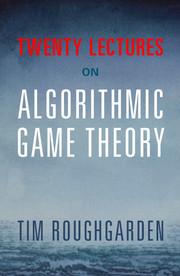Book contents
- Frontmatter
- Dedication
- Contents
- Preface
- 1 Introduction and Examples
- 2 Mechanism Design Basics
- 3 Myerson's Lemma
- 4 Algorithmic Mechanism Design
- 5 Revenue-Maximizing Auctions
- 6 Simple Near-Optimal Auctions
- 7 Multi-Parameter Mechanism Design
- 8 Spectrum Auctions 97
- 9 Mechanism Design with Payment Constraints 113
- 10 Kidney Exchange and Stable Matching
- 11 Selfish Routing and the Price of Anarchy
- 12 Over-Provisioning and Atomic Selfish Routing
- 13 Equilibria: Definitions, Examples, and Existence
- 14 Robust Price-of-Anarchy Bounds in Smooth Games
- 15 Best-Case and Strong Nash Equilibria
- 16 Best-Response Dynamics
- 17 No-Regret Dynamics
- 18 Swap Regret and the Minimax Theorem
- 19 Pure Nash Equilibria and PLS-Completeness
- 20 Mixed Nash Equilibria and PPAD-Completeness
- The Top 10 List
- Hints to Selected Exercises and Problems
- Bibliography
- Index
1 - Introduction and Examples
Published online by Cambridge University Press: 05 August 2016
- Frontmatter
- Dedication
- Contents
- Preface
- 1 Introduction and Examples
- 2 Mechanism Design Basics
- 3 Myerson's Lemma
- 4 Algorithmic Mechanism Design
- 5 Revenue-Maximizing Auctions
- 6 Simple Near-Optimal Auctions
- 7 Multi-Parameter Mechanism Design
- 8 Spectrum Auctions 97
- 9 Mechanism Design with Payment Constraints 113
- 10 Kidney Exchange and Stable Matching
- 11 Selfish Routing and the Price of Anarchy
- 12 Over-Provisioning and Atomic Selfish Routing
- 13 Equilibria: Definitions, Examples, and Existence
- 14 Robust Price-of-Anarchy Bounds in Smooth Games
- 15 Best-Case and Strong Nash Equilibria
- 16 Best-Response Dynamics
- 17 No-Regret Dynamics
- 18 Swap Regret and the Minimax Theorem
- 19 Pure Nash Equilibria and PLS-Completeness
- 20 Mixed Nash Equilibria and PPAD-Completeness
- The Top 10 List
- Hints to Selected Exercises and Problems
- Bibliography
- Index
Summary
This book has three parts, each with its own overarching goal. Lectures 2–10 develop tools for designing systems with strategic participants that have good performance guarantees. The goal of Lectures 11–15 is to understand when selfish behavior is largely benign. Lectures 16–20 study if and how strategic players reach an equilibrium of a game. The three sections of this lecture offer motivating examples for the three parts of the book.
The Science of Rule-Making
We begin with a cautionary tale. In 2012, the Olympics were held in London. One of the biggest scandals of the event concerned, of all sports, women's badminton. The scandal did not involve any failed drug tests, but rather a failed tournament design that did not carefully consider incentives.
The tournament design used is familiar from World Cup soccer. There are four groups (A, B, C, D) of four teams each. The tournament has two phases. In the first “round-robin” phase, each team plays the other three teams in its group, and does not play teams in other groups. The top two teams from each group advance to the second phase, while the bottom two teams from each group are eliminated. In the second phase, the remaining eight teams play a standard “knockout” tournament. There are four quarterfinals, with the losers eliminated, followed by two semifinals, with the losers playing an extra match to decide the bronze medal. The winner of the final gets the gold medal, the loser the silver.
The incentives of participants and of the Olympic Committee and fans are not necessarily aligned in such a tournament. What does a team want? To get as prestigious a medal as possible. What does the Olympic Committee want? They didn't seem to think carefully about this question, but in hindsight it is clear that they wanted every team to try their best to win every match. Why would a team ever want to lose a match? Indeed, in the knockout phase of the tournament, where losing leads to instant elimination, it is clear that winning is always better than losing.
- Type
- Chapter
- Information
- Twenty Lectures on Algorithmic Game Theory , pp. 1 - 10Publisher: Cambridge University PressPrint publication year: 2016
- 1
- Cited by



